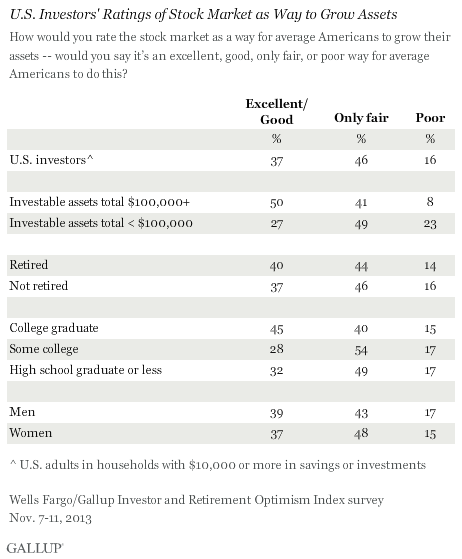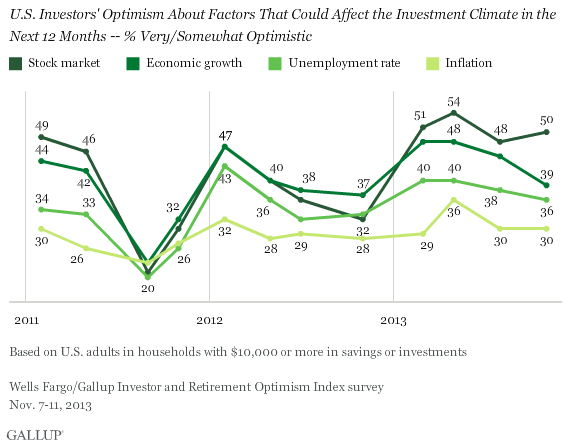PRINCETON, NJ -- U.S. investors are generally wary about stocks as a way for Americans to build wealth, as 37% say the stock market is an "excellent" or "good" way for average Americans to grow their assets, while 46% consider it "only fair," and 16% call it "poor." Large class investors -- those with $100,000 or more in investable assets -- are significantly more upbeat about the market's value as a wealth generator than those with less than $100,000 of such assets, but still only 50% rate it positively.

This is according to the Nov. 7-11 Wells Fargo/Gallup Investor and Retirement Optimism Index survey -- conducted shortly before the Dow Jones industrial average crossed the record 16,000 mark in November. The market surged to another all-time high on Wednesday, closing above 16,100 for the first time.
The survey, conducted quarterly, is based on U.S. adults with $10,000 or more in savings or investments, or roughly 40% of the general public. Of this group, 45% report having $100,000 or more in investable assets, while 49% have less than $100,000.
Although investors are cautious about the long-term utility of the stock market for growing assets, they currently have more confidence in the stock market's near-term outlook than in the outlook for other major aspects of the economy. Fifty percent are either very optimistic or somewhat optimistic about the performance of the stock market over the next 12 months, contrasted with 39% who are optimistic about economic growth, 36% who are optimistic about the unemployment rate, and 30% who are optimistic about inflation.
The surplus optimism about the stock market relative to other aspects of the economy is currently greater than at any time in the past three years.

Similarly, in thinking about their own retirement savings, 51% of U.S. investors say now is a "good time" to invest money in the financial markets, slightly outweighing the 45% who consider it "not a good time." Larger investors express greater confidence in the stock market, with 58% of those with $100,000 or more in investments saying it is a good time to invest vs. 45% of those who have less money invested.
Bottom Line
The stock market is poised to end the year up nearly 25%, offering investors impressive gains that should help many recoup from the losses they experienced during the 2008-2009 recession, as well as from lesser stock market stumbles since 2009. U.S. investors, thus, have good reason to view the stock market positively, and indeed their view of it is positive relative to other sectors of the economy. This is particularly true for large investors, whose recent gains may be exponentially greater than those with less money invested.
Still, U.S. investors' positive outlook seems muted. In November -- after three quarters of solid stock market gains and the Dow on the verge of breaking 16,000 -- barely half viewed it as a good time to invest or expressed optimism about where the market is heading in the next 12 months. This begs the question of what it would take for investors to show real exuberance about the stock market. The answer is likely a strong stock market coupled with a booming economy -- the combination that produced 60% or better optimism on this measure in the late 1990s.
Investors' cautiousness about investing in the stock market right now also helps explain their longer-term skepticism about the stock market as good way for average Americans to grow assets. Investors have been on a bumpy ride these past few years, and are understandably doubtful that average Americans should count on the market for their financial security.
Survey Methods
The Wells Fargo/Gallup Investor and Retirement Optimism Index results are based on questions asked on the Gallup Daily tracking survey of a random sample of 1,014 U.S. adults having investable assets of $10,000 or more Nov. 7-11, 2013.
For results based on the entire sample of national adults, one can say with 95% confidence that the maximum margin of sampling error is ±3 percentage points.
In addition to sampling error, question wording and practical difficulties in conducting surveys can introduce error or bias into the findings of public opinion polls.
For more details on Gallup's polling methodology, visit www.gallup.com.
